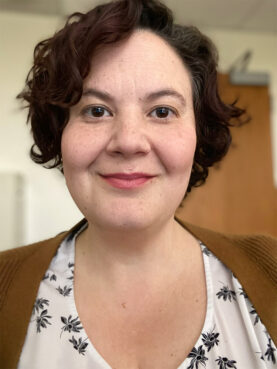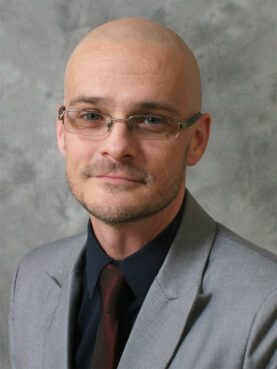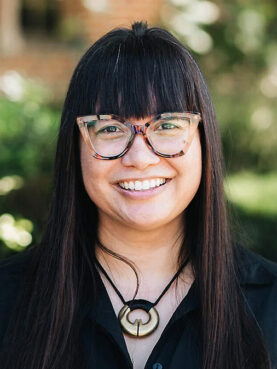(RNS) — Religiously unaffiliated Americans represent about 28% of the country’s population, according to 2024 Pew Research Center data. As this demographic has grown, so, too, have the number of religiously unaffiliated chaplains.
Chaplains often sit with patients and families in hospitals as they face some of the most difficult moments of their lives. They work on university campuses providing a listening ear and guidance to students as they maneuver young adulthood. And for the last 250 years, they have offered spiritual support to their fellow service members in the U.S. military. Regardless of the setting, chaplains provide spiritual or pastoral care. As religious demographics overall shift, so too do the religious identities represented amongst chaplains.
“I think one of our primary (roles) is accepting and acknowledging things the way they are,” said Mariela Gonzalez, a hospital chaplain at Advocate Aurora Health in Downers Grove, Illinois. “Then, inviting a patient to reflect on what might connect them to goodness, or love or hope in those difficult moments. But not moving them toward that if it’s not where they are.”
Gonzalez identifies as a humanist, a belief system that drives her chaplaincy work in combatting dehumanization in the health care system — “the idea that a person is a commodity in the hospital, or you know, a cog in the machine of the health care industrial complex,” she said. She described her work as being “able to have a sense of (a patient’s) personhood and their wholeness.”

Mariela Gonzalez. (Courtesy photo)
Many employers expect chaplains to either be board certified or at least working toward it. There are a number of requirements to receive board certification including, among other things, a master’s degree in either theology, philosophy or psychology, completed units of clinical pastoral education and endorsement or recognition from a faith group recognized by the Board of Chaplaincy Certification Inc. While the list of faith groups recognized by BCCI is extensive, the options for non-religious chaplains are still limited.
One of the few endorsing bodies for non-religious chaplains is the Humanist Society, which was started by a group of Quakers in 1939 and is led by values based on the principles of humanism. It has been recognized by BCCI since 2014.
Ben Iten, president of the Humanist Society, said successful chaplaincy applicants meet BCCI criteria, completing CPE units and receiving a Master of Divinity or an equivalent degree — like other faith organizations that certify chaplains. However, the applicant also needs to show they are a humanist.
“When we are endorsing folks, a lot of our dividing lines right now (are in) the humanist manifesto, (which) talks about that humanism believes that humanity is able to live moral and ethical lives without supernaturalism,” Iten said. “… ‘Without supernaturalism’ has kind of been our dividing line lately … that has kind of become our boundary for who we let in and who we let out.”
The Humanist Society, which is active throughout and beyond the U.S., currently endorses 139 chaplains, Iten said. It receives, on average, four applications for endorsement a month, which he anticipates will grow closer to six a month in the next year.
Gonzalez said the issue of endorsement has been a prominent topic of conversation for chaplains, particularly non-religious ones. While some in the industry question whether endorsement is needed, she believes having institutional community connection is important for a chaplain’s self-orientation.
“I think if smaller communities could form that would have some structure of accountability and participation, that would help for people to have that accountability, have that grounding, have community,” she said. “More (endorsing bodies) would form, just grassroots.”

Ben Iten. (Courtesy photo)
Iten also works as a hospital chaplain with OhioHealth, a nonprofit health care system in Central Ohio affiliated with the United Methodist Church, and is a certified educator with the Association of Clinical Pastoral Education. He defines his religion as humanism and says his work is about providing community and human connection.
Most patients Iten and his students see say they are religious. He estimated that only about 1% to 2% of patients in his hospital identify themselves as non-religious. He thinks that number is actually higher but said in the presence of a chaplain, patients often conceal non-religious identities.
In most settings a chaplain works in, regardless of their spiritual or religious orienting system, they meet with care recipients of all faith backgrounds. As such, chaplains who don’t follow any one religion are well-poised to adapt to any type of spiritual support sought.
Gonzalez acknowledged that some patients want a chaplain to perform more overtly religious or spiritual rituals, such as prayer, which nonreligious chaplains can also facilitate. In those moments, she asks them, “How do you want to pray?” and follows their lead. For example, when a patient told her, “We pray in the name of Jesus,” Gonzalez invoked Jesus’ name in the prayer she offered.
Two prominent non-traditional chaplains include Greg Epstein and Devin Moss. Epstein works as a humanist/agnostic/atheist chaplain at Harvard University and Massachusetts Institute of Technology. On his bio page at Harvard, it is noted that New York Times Magazine described him as ”a ‘godfather to the (humanist) movement.’” Moss’ work with fellow atheist and convicted killer Phillip Hancock was highlighted in The Times last year.

Vanessa Gomez Brake. (Courtesy photo)
Vanessa Gomez Brake, university chaplain at the University of Southern California, said growing up Catholic, she saw priests as spiritual authorities. Now, she identifies as a secular humanist and culturally Catholic, and her work represents these interfaith dynamics of chaplaincy. She said when it comes to helping others create ritual spaces, she can do anything — and does. On USC’s campus, she helps organize everything from Ramadan festivities to Diwali celebrations, aiming to ensure students of all faith traditions can access their sites of worship. She also advocates for recognizing whatever belief systems students identify with.
At her hospital in Downers Grove, Gonzalez estimates she meets with one to two patients weekly who self-disclose as non-religious. She said when patients hear she is a chaplain, they will sometimes use language like, “well, I used to be this” religion. In those moments, she tries to let them know, “It’s OK to be where you are now,” she said.
Iten said he teaches his students that when someone shares they are non-religious, to treat that moment as a sort of coming out. “Thank the patient for trusting you with that,” he said. “Give them some sort of empathetic reflection like, ‘I hear it’s hard to be atheist in America these days. What’s that like for you?’”
Gomez Brake said that a solid third of students she meets on campus identify as non-religious, pointing to a generational trend toward religious disaffiliation in younger adults. That doesn’t mean her role is any less significant.
“I think people are just as spiritual and religious as they’ve ever been,” she said, “but we’re finding new terminology for it because we don’t trust the institutions. … We don’t want to be affiliated with them, but folks still have needs for their spiritual well-being and health.”
Asked about having to defend their nontraditional belief systems in a traditionally religious industry, each of the chaplains RNS spoke with had different experiences. Gonzalez said she doesn’t feel she has to defend herself, but rather works to educate others about and advocates for non-traditional chaplains. Iten, however, said, “The higher up I got in certification, the more I had to defend myself.” While as an intern, having to defend his spiritual route was minimal, as he worked toward chaplaincy board certification and then took on the process to become an educator, his humanism often seemed to come into question.
For Gomez Brake, the experience has been different. “Students don’t care,” she said, noting, however, that some of the religious affiliates she works with have been surprised to learn an atheist has a Master of Divinity degree. She also said she doesn’t believe non-religious chaplains are as new of a phenomenon as many people think.
“There have always been people of every worldview who have been serving in these chaplain roles,” she said. “It’s just the stereotypes of a chaplain are always very Christian.”



